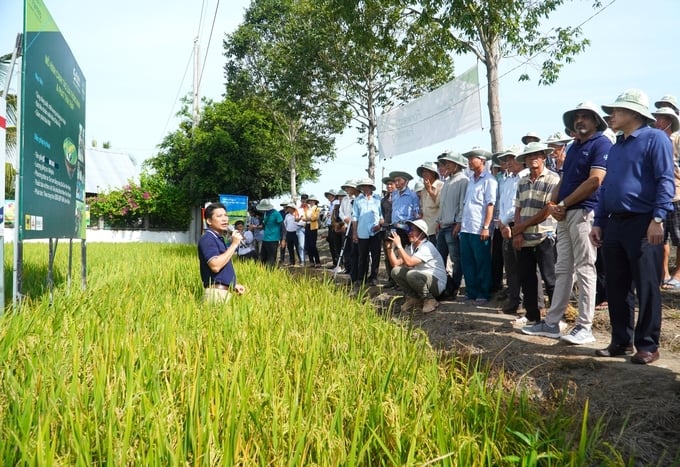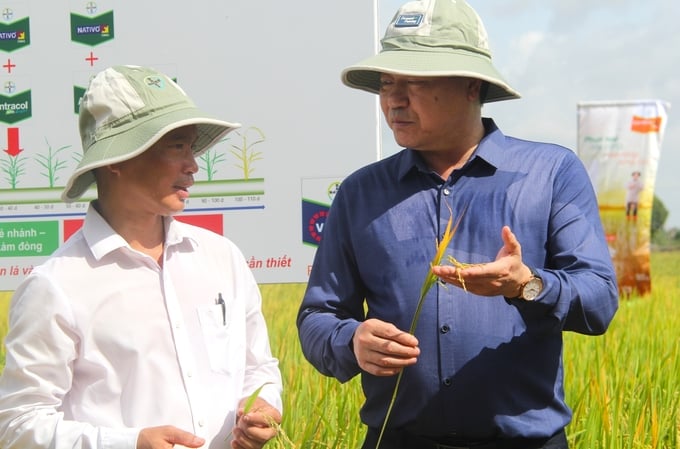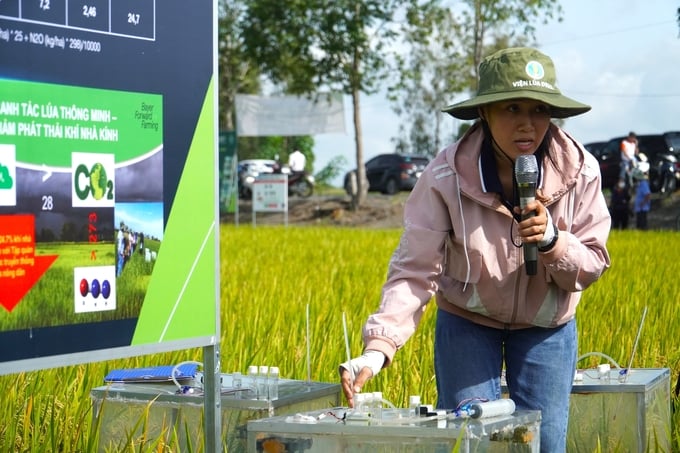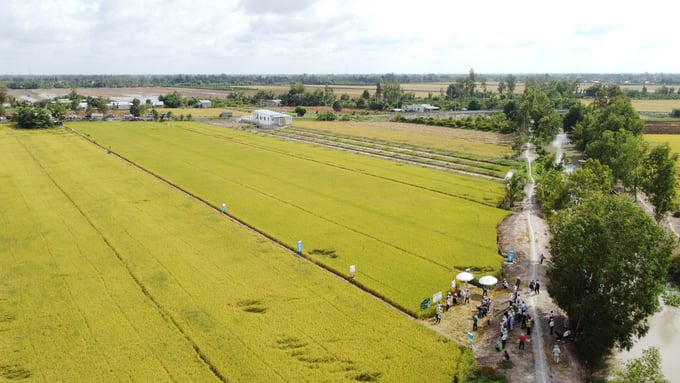November 25, 2025 | 12:37 GMT +7
November 25, 2025 | 12:37 GMT +7
Hotline: 0913.378.918
November 25, 2025 | 12:37 GMT +7
Hotline: 0913.378.918
The event featured a visit to a 2.4-hectare experimental production field in Dong Thuan commune, Thoi Lai district, Can Tho city. Additionally, experts and local farmers discussed advanced production methods during a seminar titled "Potential Expansion of the Forward Farming Model – Sustainable Agriculture Development in support of the Project for one million hectares of specialized, low-emission high-quality rice in association with green growth in the Mekong Delta region."

Farmers visiting experimental production fields and receiving introductions to the Forward Farming model by experts from Bayer Vietnam. Photo: Kim Anh.
According to Le Quoc Thanh, Director of the National Agricultural Extension Center, the Center developed the "Sustainable Rice Production Development – Forward Farming" initiative in collaboration with Bayer Vietnam and several strategic partners in the rice production value chain. These partners include the Departments of Agriculture and Rural Development of Mekong Delta provinces; the Cuu Long Delta Rice Institute, Saigon Kim Hong Trading Services Co., Ltd; Binh Dien Fertilizer Joint Stock Company; and VinaRice Co., Ltd.
The Forward Farming model incorporates advanced domestic and international technologies to support farmers in reducing production costs for seeds, fertilizers, pesticides, and water; and minimizing environmental emissions. This approach enables farmers to produce high-quality rice products that meet the demands of challenging markets.

Le Quoc Thanh, Director of the National Agricultural Extension Center (right), commends the Forward Farming model initiative and plans to expand it in the future. Photo: Kim Anh.
Le Quoc Thanh commended the model's results as well as the role of participating agencies. The National Agricultural Extension Center, Bayer Vietnam, and partners will develop a detailed implementation plan, and continue researching, developing and evaluating the effectiveness of applied technologies in order to expand the scope of the model. In addition, stakeholders will expand the network of strategic partners and training targets in the Mekong Delta provinces.
The success of the Forward Farming model has facilitated the expansion of advanced rice production practices in the Mekong Delta region; thereby contributing to the successful implementation of the Project for one million hectares of specialized, low-emission high-quality rice, as promoted by the Ministry of Agriculture and Rural Development.

Officers from the Cuu Long Delta Rice Institute conducting greenhouse gas emission measurements within the Forward Farming model. Photo: Kim Anh.
Director Thanh encouraged farmers participating in the model to become agricultural extension workers that assist in guiding and disseminating the model to other farmers.
The Forward Farming model has achieved numerous positive results over three separate crops. Most notably, the combination of suitable fertilization and irrigation methods and the application of Bayer's "Much More Rice" solution promoted the growth of rice plants under optimal conditions.
The model has reduced seed sowing quantities by 2.5 to 3 times, i.e: from between 150 and 180 kilograms per hectare to 60 kilograms per hectare; reduced water usage by nearly 50%, i.e: 110 cubic meters per hectare per crop; and reduced greenhouse gas emissions by 24.7%.
Moreover, the Forward Farming model allows farmers to reduce input costs by 1.5 to 4 million VND per hectare. These factors increased economic efficiency by 13.1 to 54.9% compared to that of traditional farming practices.

The OM5451 rice variety is cultivated within the model's 2.4-hectare field at a rate of 60 kilograms per hectare. The model employs Saigon Kim Hong Company's cluster sowing method, Bayer's Much More Rice pesticide solution, and Binh Dien Company's 63N - 36P - 34K fertilizer formula. Photo: Kim Anh.
The model has provided training on high-quality rice production and the effective, safe, and responsible use of pesticides to over 4,500 farmers in An Giang, Kien Giang, and Can Tho city.
Key activities under the Forward Farming model include the integrated application of advanced rice production solutions and technologies on experimental fields, as well as effective emission control and environmental impact management. Additionally, the model supports the enhancement of farmers' capacity and knowledge for sustainable farming through training programs; and promotes public-private partnerships throughout the rice production value chain.
On the afternoon of April 9, the Department of Plant Protection under the Ministry of Agriculture and Rural Development and Bayer Vietnam Company Limited signed a commitment to implement the "Guidelines for Safe and Effective Pesticide Use; Development of Production and Utilization of Biological Pesticides" plan for 2024. This commitment outlines the objectives of the cooperation program which spans from 2021 to 2025, as previously agreed upon by both parties.
Translated by Nguyen Hai Long

(VAN) Heavy rains make aquatic species more vulnerable to disease. Proactive water management and high-tech systems help farmers prevent outbreaks and protect yields.

(VAN) Greenhouses are shifting production mindsets in Binh Lu commune, enabling farmers to ‘weather the sun and rain’ and secure stable vegetable harvests throughout the year.

(VAN) Green transition is crucial for the Mekong Delta amid climate change and stricter standards, offering a path toward sustainability.

(VAN) Dong Thap promotes agricultural restructuring, forms large specialized farming zones, raises the value of agricultural products and develops toward ecological and high-tech directions.
/2025/11/22/4018-4-213342_747.jpg)
(VAN) The Mekong Delta Agricultural Experts Club has attracted 143 experts and researchers to participate in providing consultancy and contributing initiatives to the development of one million hectares of high-quality rice.

(VAN) Ca Mau’s development of OCOP products opens a path to increasing cooperatives value, helping boost income, expand markets, and affirm collective economy's role.

(VAN) Turning seemingly ordinary coconut shells into unique jewelry and artwork, Nguyen Bang Nhi spreads the value of local culture through her brand, Cocohand.